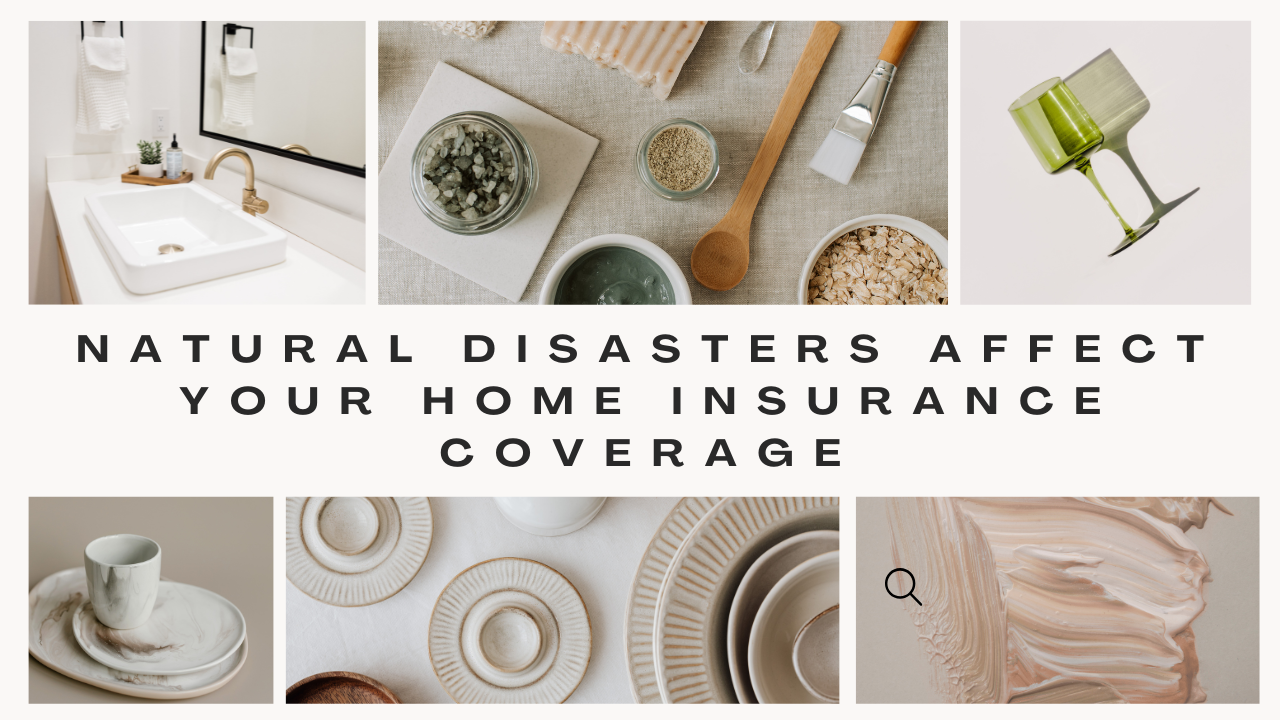Understanding Natural Disasters and Home Insurance: An Overview
Natural disasters can feel like uninvited guests crashing your house party—utterly disruptive and often very expensive. They don’t knock before entering, and if they do arrive, it’s usually with a vengeance. Understanding how these events impact your home insurance coverage is crucial to ensuring that you and your home are well-protected.
The Unexpected Guests: What Counts as a Natural Disaster?
Natural disasters can take many forms, including hurricanes, floods, earthquakes, wildfires, tornadoes, and even winter storms. Each has its own impact on your home, and understanding these specifics will help you navigate insurance coverage more effectively.
Home Sweet Home: Why Insurance Matters More After a Disaster
When disaster strikes, insurance can be the difference between recovery and financial ruin. Home insurance is not just a nice-to-have; it’s your financial safety net. It’s like a warm blanket after a storm—comforting, essential, and hopefully within reach when you need it most.
Types of Natural Disasters and Their Insurance Implications
Here’s a closer look at some common natural disasters and how they specifically interact with home insurance.
Hurricanes: Riding the Wind of Change
Hurricanes can unleash winds that feel like they’ve been borrowed from a rocket engine. Home insurance can cover wind damage, but be prepared: many policies also come with separate hurricane deductibles, particularly in coastal areas.
Floods: When Your Home Becomes an Aquarium
Flooding often comes as a surprise, transforming your living room into an unwelcome indoor pool. Standard home insurance policies typically don’t cover flood damage, so if you live in a flood-prone area, consider investing in separate flood insurance. It’s always better to avoid swimming with the fishes—unless that’s your thing.
Earthquakes: Shaking Up Your Coverage
Earthquakes can leave your home in a jumbled mess. Unfortunately, many standard policies don’t include earthquake coverage. If you live in an earthquake-prone location, it’s wise to seek additional coverage specifically for seismic activity. Think of it as buying peace of mind that even tectonic plates can’t shake away.
Wildfires: The Hot Topic in Insurance
Wildfires can spread rapidly, leaving little time for prep. Many insurance policies cover fire damage, but you must ensure that wildfire protection is included, especially if you live in a “fire zone.” After all, no one wants to lose their home to a literal fire drill.
Tornadoes: Spin Cycles and Coverage Ups and Downs
Tornadoes might be nature’s equivalent of a washing machine gone haywire. Most insurers cover tornado damage, but like hurricanes, it’s crucial to review the specifics and ensure you understand your policy’s deductibles.
Winter Storms: The Cold Hard Truth About Coverage
Winter storms can leave you with damages from ice dams, fallen branches, and even frozen pipes. Most home insurance policies should cover this, but always double-check the fine print, as you wouldn’t want to learn the hard way that frostbite extends to your wallet too.
Landslides: Sliding Into Uncharted Territory
Living in a hilly area comes with its own set of challenges. Landslides can wreak havoc on homes, and often, this coverage is not included in standard policies. Additional coverage may be essential if you’re in a high-risk area.
How Your Policy Works: The Fine Print
Let’s dive deep into the nitty-gritty of home insurance policies.
Dwelling Coverage Explained: What’s Included and What’s Not
Dwelling coverage protects the structure of your home against covered threats. This could mean everything from roof damage to busted walls. Just remember, it doesn’t cover your backyard barbecue—sorry, but even the best policies have limits.
Personal Property Coverage: Saving Your Stuff Before It’s Too Late
Your belongings are usually covered under personal property insurance, offering protection for everything from furniture to electronics. However, high-value items like jewelry may need additional coverage, so check if your policy has a cap on what it considers “normal”!
Liability Coverage: When Mother Nature Hits Below the Belt
Liability protection helps if someone is injured on your property due to a disaster-related event, like a tree falling on their car. It’s like having a superhero on your side—just in case fate has some bitter surprises planned.
Additional Living Expenses: Covering Your Couch Surfing
If you can’t stay in your home due to disaster damage, additional living expenses (ALE) coverage can help cover costs like hotel stays or food. ALE ensures you don’t have to live on takeout and ramen noodles while you’re displaced. You deserve better than that, right?
Exclusions and Limitations: Reading Between the Lines
Not All Heroes Wear Capes: The Perils of Exclusions
Unfortunately, some policies come with exclusions that might leave you feeling like you’ve been duped. Always read the fine print to ensure you’re not caught off guard after a disaster.
Earthquake and Flood Coverage: The Gigantic Gaps
As mentioned, many home insurance policies explicitly exclude earthquakes and floods. If you live in at-risk areas for either, it’s essential to obtain separate policies. Don’t be the one who learns this lesson the hard way.
Understanding the Role of Deductibles in Disaster Recovery
Deductibles can significantly impact your recovery. They represent the amount you’ll need to pay out of pocket before insurance kicks in. Be prepared for this financial hurdle when assessing your overall coverage.
When Disaster Strikes: Steps to Take Immediately
Assessing Damage: A Homeowner’s Guide to the Aftermath
After the dust settles (or the water recedes), it’s time to check for damage. Take a deep breath, and then document everything with photos. Your future self will thank you for this insurance selfie session.
Contacting Your Insurance Company: The Right Way to Dial for Help
Notify your insurer as soon as you can. Be clear and concise, providing necessary details like policy numbers and damage assessment. Keep cool, even if you feel like your world is crumbling. Your insurance agent isn’t a magician, but they can work wonders if you’re organized!
Documenting Losses: Picture Perfect Evidence for Claims
Besides taking photos, keep receipts and records of damaged items. Your claim will be stronger with comprehensive documentation, so think of it as your insurance version of bragging rights!
Filing Your Claim: The Ins and Outs
The Claims Process: Simplifying the Red Tape
Once you’ve assessed damage and contacted your insurer, it’s time to file a claim. Each insurance company has its own process, so familiarize yourself with the specific steps. It might feel like you’re doing the insurance tango, but it’s worth it when you get the rhythm down.
Common Claim Denials: When Your Insurance Says “No”
Unfortunately, some claims get denied. Common reasons include insufficient coverage, lack of documentation, or, surprisingly, being in a flood zone without flood insurance. Stay one step ahead by knowing these pitfalls.
Appeals and Reassessments: Fighting the Good Fight
If your claim is denied, don’t give up! You have the right to appeal the decision. Gather your evidence and present a case. It’s like a courtroom drama—without the dramatic monologues (unless you want to do those anyway!).
Preventing Future Problems: Preparing Your Home and Policy
Updating Your Insurance Coverage: Don’t Wait for the Storm to Strike
Regularly review your home insurance policy and update it as needed. Just like updating your wardrobe for the changing seasons, your insurance needs to evolve. If your home changes—whether through renovations or acquiring new valuables—make sure your coverage reflects that.
Disaster Preparedness Plans: Being Your Own Superhero
A comprehensive disaster preparedness plan can help mitigate damage. Know escape routes, create an emergency kit, and establish communication plans. It’s about becoming the superhero who’s always ready for battle!
Home Improvements That Can Save You: From Roofs to Gardens
Consider reinforcing your home against natural disasters. Invest in sturdy roofing, storm shutters, and even fire-resistant landscaping. Your investment can lead to reduced premiums down the line—who says you can’t save money while saving your home?
The Role of State and Federal Assistance
When Insurance Isn’t Enough: Understanding FEMA Grants
When disasters occur, state and federal assistance programs like FEMA offer support. Learn how and when to apply for these resources. Sometimes, even superheroes need backup!
Navigating Government Programs: A Helping Hand or a Hamper?
Government assistance can vary significantly based on location and disaster type. Research what’s available in your state, as it can be a game-changer in recovery efforts.
Conclusion: Embracing the Unpredictable
Preparing for Tomorrow, Today: Insurance as a Safety Net
Natural disasters are unpredictable, but being prepared can minimize their impact. Home insurance is your safety net, and understanding it empowers you to bounce back when the unexpected occurs.
Final Thoughts: Laughing in the Face of Disaster
Sure, disasters aren’t funny, but maintaining a sense of humor can help. Remember, you are not alone; many have walked this path. By staying informed and prepared, you can face the storm with confidence.
FAQs: Common Queries About Home Insurance and Disasters
What should I do if my insurance doesn’t cover flood damage?
Consider purchasing separate flood insurance, as many standard policies do not cover this type of damage. Reach out to your insurance agent for recommendations.
Can I get coverage for natural disasters if I live in a high-risk area?
Yes, you can often get coverage, but it might come with higher premiums. Be sure to discuss your specific situation with your insurance provider.
How often should I review my home insurance policy?
It’s good practice to review your insurance annually and after any significant life changes, home improvements, or disasters.
What should I do if my home is damaged but I’m still making mortgage payments?
Contact your insurance company to file a claim, and keep up with mortgage payments as usual. They will guide you through recovery.
By understanding how natural disasters affect your home insurance coverage, you equip yourself with the knowledge to face adversities head-on. Let’s be proactive, not reactive—after all, it’s about saving our homes, our finances, and maybe even saving a few laughs along the way.







